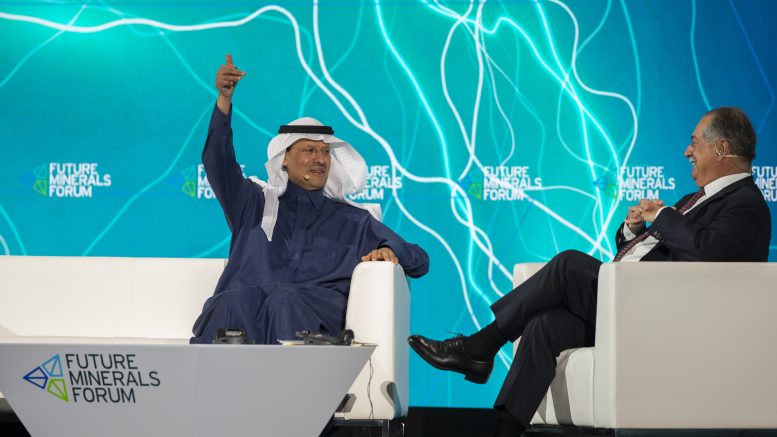Saudi Arabia hosted its first ever Future Minerals Forum from 11 to 13 January in its capital Riyadh, to provide insight into the Kingdom’s mining potential and address concerns about the need to increase the supply of critical minerals required to help the world meet its decarbonization goals by 2050.
The world’s fourth largest importer of metals is looking to accelerate the exploration and mining of critical minerals in the country and become a new global mining hub.
The country passed a new minerals investment law last year, which officials say, will help create a stronger mining “ecosystem.” In the first ten months of 2021, the nation provided 13 reconnaissance licenses, 133 exploration licenses, and eight exploitation licenses, according to government data.
In addition, the government has designed 40 initiatives that are expected to unlock an estimated US$1.3 trillion worth of potential mineral value across the Arabian shield.
One of those includes providing online access to 80 years of geological, geophysical, and geochemical information with 10,000 detailed reports on mining targets and prospects, through the newly established National Geographic Database.
“This event will focus on a very major endowment of Saudi, which is minerals, and it could not have come on a better time than today when we are going through energy transition,” Prince Abdulaziz bin Salman, the Kingdom’s Energy Minister, said during a keynote fireside chat at the conference.
He further said that the world needed a well-planned transition to cleaner energy, instead of a leap into the “unknown future” which could create a new energy challenge.
An example of the challenge the energy minister was referring to are the rising prices of metals like copper, lithium and nickel that have seen a sudden hike in demand due to the increased usage of electric vehicles globally and shortage in supply.
Bin Salman said that the world shouldn’t transition away from oil just to move away from the “old classical concern” of being overly reliant on the Middle East for energy. A sudden transition, he said, could lead to “energy security challenges” for countries dealing with the availability of minerals.
According to the minister, the energy transition should focus on three “pillars”. It shouldn’t impact energy security, it should focus on the “billions of people” who haven’t had their share of development, and tackle climate change.
“We have to be seriously attentive to climate change, without which we’re not going to create a sustainable economy, and it’s the sustainable way of living,” Bin Salman said.
He also said that the country was keen on exploring its uranium resources. “We do have a huge amount of uranium resources … we will be exploiting that resource and developing the yellow cake and we will be commercially monetizing that value resource.”
Echoing a similar sentiment, Kalid Al Mudaifer, Saudi Vice-Minister for Mining Affairs at the Ministry of Industry and Mineral Resources, said that the Kingdom is “forging a path to becoming not only a regional but a global hub for exploring and mining the critical minerals needed for this global transformation.”
The forum “will show how Saudi Arabia can provide a blueprint for building and financing a modern, responsible, and sustainable mineral exploration and mining industry for other countries in the Middle East, Central and West Asia, and Africa,” Al Mudaifer said.
“Our mining strategy could be replicated in other countries across the region to help them exploit their mineral wealth, transforming the region into the next major mining jurisdiction.”


A ‘counter’ to the New Silk Road?